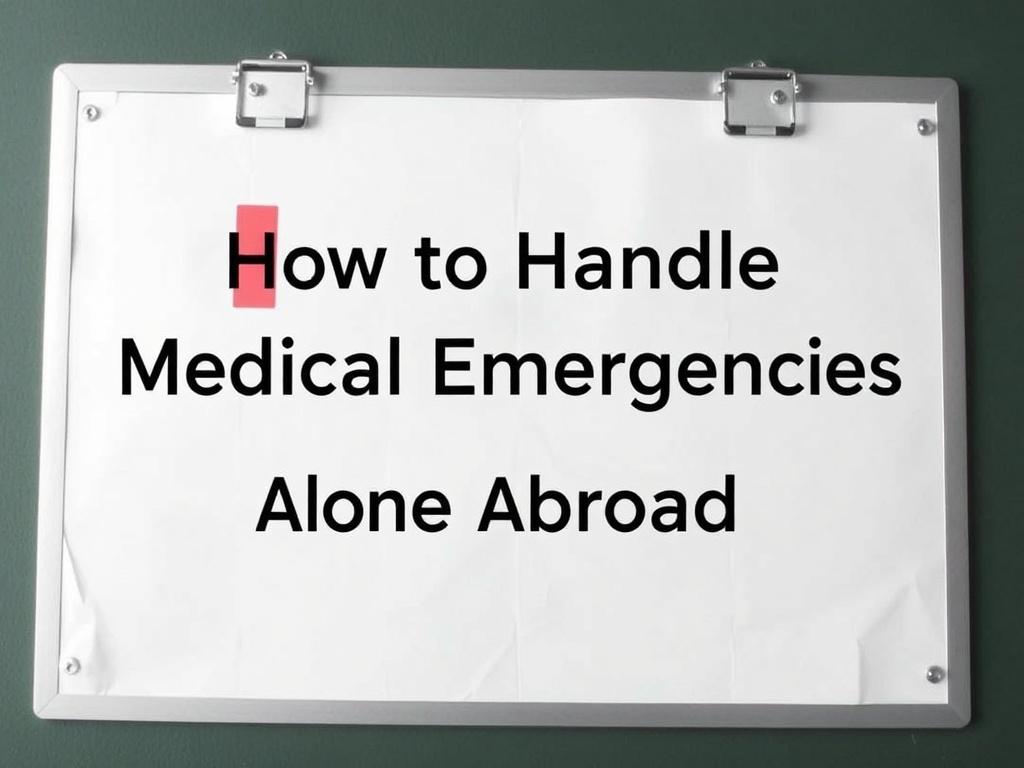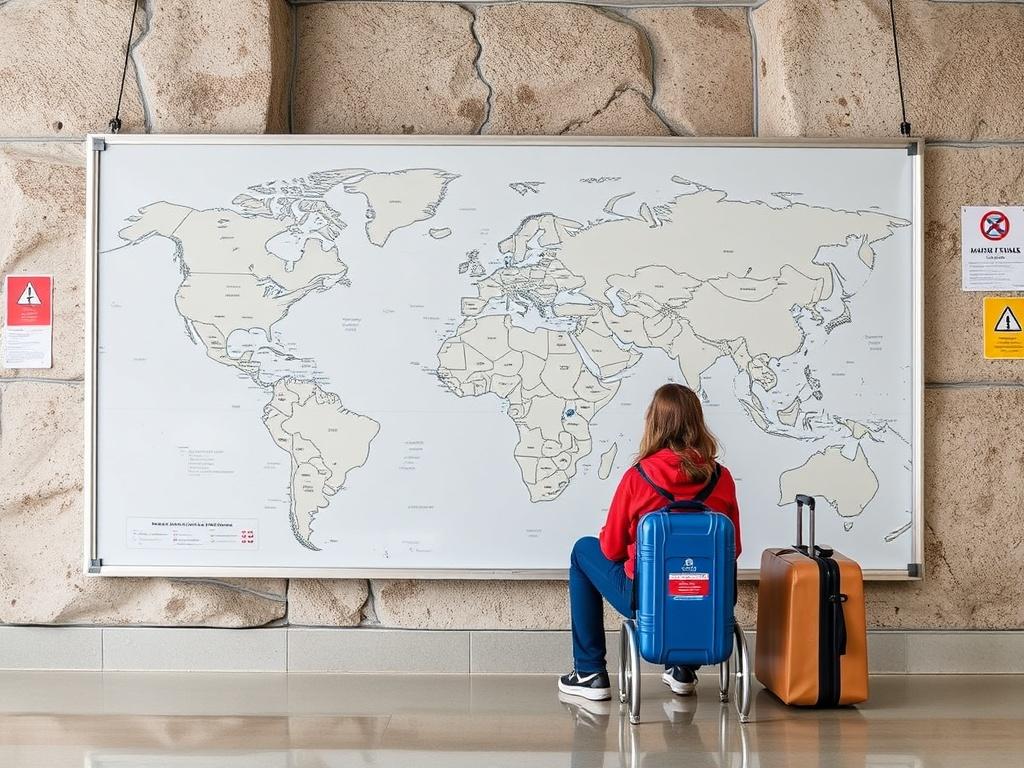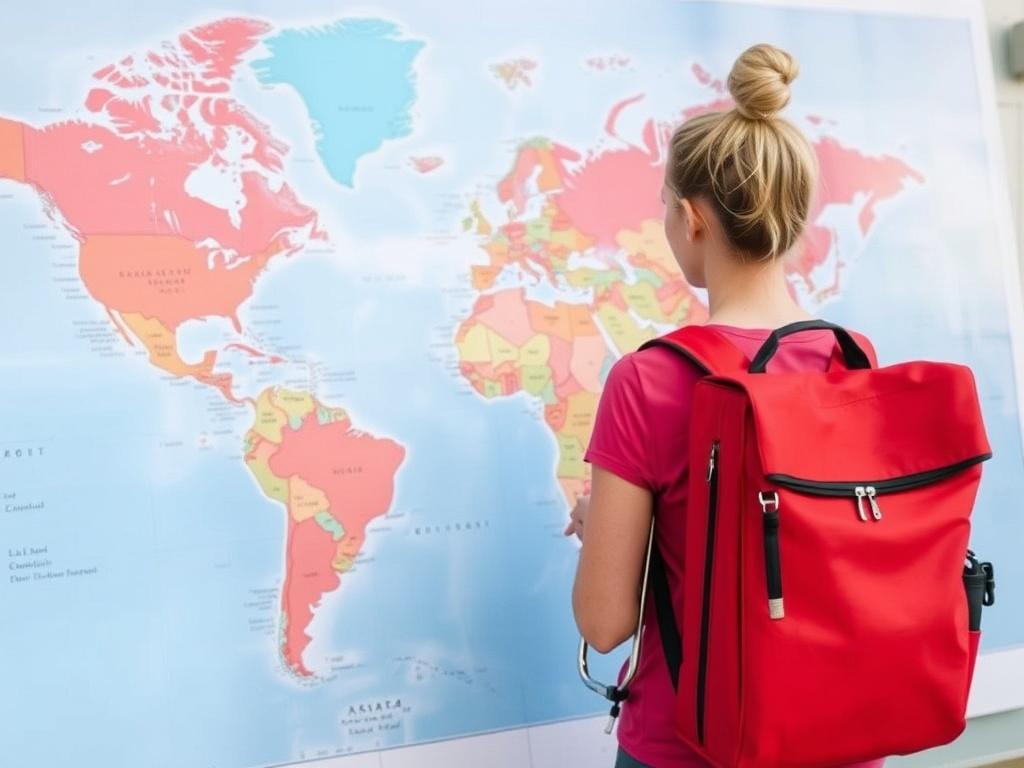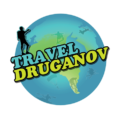Traveling alone abroad can be one of the most enriching and exciting experiences a person can have. You set out on a journey of self-discovery, adventure, and cultural immersion, all while embracing the freedom to make your own decisions. However, amidst the thrill and excitement, the reality is that medical emergencies can happen anytime and anywhere, and being alone during such moments can be especially daunting. Knowing how to handle medical emergencies alone abroad isn’t just about staying calm—it’s about being prepared, well-informed, and equipped to act decisively when called for.
In this comprehensive article, we will walk you through everything you need to know to stay safe, manage stress, and handle medical emergencies all by yourself while traveling overseas. We’ll explore practical steps on how to find medical help, what to carry in your travel first aid kit, how to communicate effectively in foreign healthcare settings, and how to stay financially protected against unexpected medical expenses. Whether you are planning a quick city trip or an extended stay in a remote location, understanding these essential tips will give you confidence and peace of mind.
Why Being Prepared for Medical Emergencies Alone Abroad Matters
When you’re traveling solo, the stakes of a medical emergency feel much higher because you can’t immediately rely on a travel companion to help. You need to be your own advocate. For many travelers, medical emergencies abroad range from minor injuries and illnesses like cuts, food poisonings, or fevers, to more serious conditions that require urgent professional care. The difficulty arises from unfamiliar healthcare systems, language barriers, and the emotional challenge of facing pain or fear without anyone physically beside you.
Preparation, therefore, becomes the cornerstone of reducing risk and improving your chances of a good outcome. Even if you are young and healthy, accidents do happen, and sometimes pre-existing conditions can unexpectedly flare up. Luckily, with a little foresight and some practical planning, you can handle most medical situations confidently and calmly. Being proactive about health and safety, knowing what your options are, and having strategies to communicate and get help can literally save your life abroad.
Know Your Risks: Common Medical Emergencies Solo Travelers Face
It’s helpful to understand the kinds of medical emergencies you might encounter while traveling solo so you can prepare appropriately. Here are some of the most common issues reported by solo travelers abroad:
- Gastrointestinal Illnesses: Food poisoning, diarrhea, and dehydration are some of the most frequent problems, often caused by unsafe food or water.
- Minor Injuries: Sprains, cuts, bruises, and insect bites can happen during hiking, sightseeing, or just walking around unfamiliar places.
- Chronic Illness Flare-Ups: If you have pre-existing conditions like asthma, diabetes, or allergies, stress and different environments can trigger symptoms.
- Heat Stroke and Sunburn: Particularly in hot climates, overexposure to sun and heat can cause serious issues.
- Respiratory Infections: Colds, flu, or more serious respiratory infections can occur, especially in crowded or cold environments.
- Accidents and Trauma: Falls, car accidents, and other injuries might require emergency care.
Understanding these common risks helps you think about what precautions to take and which items to pack in your travel medical kit.
Preparing a Travel First Aid Kit for Solo Travelers
One of the smartest steps to handle medical emergencies alone abroad is to carry your own travel first aid kit. This kit isn’t just a collection of random bandages and pills; it’s a thoughtfully curated set of supplies tailored to your health background, your destination, and the activities you plan to do. Here’s a practical list to get you started:
| Item | Purpose | Notes |
|---|---|---|
| Adhesive Bandages & Sterile Gauze | For cuts, scrapes, and wounds | Include different sizes |
| Antiseptic Wipes or Solution | Clean wounds to prevent infection | Useful before applying bandages |
| Pain Relievers (Ibuprofen, Acetaminophen) | Relieve pain, fever, and inflammation | Bring your preferred brand and a sufficient supply |
| Antihistamines | For allergic reactions and insect bites | Also useful for hay fever or allergies |
| Oral Rehydration Salts | Prevent dehydration from diarrhea or heat | Compact and essential in hot climates |
| Prescription Medications | Your regular meds & any emergency prescriptions | Carry extra supply and keep in original packaging |
| Thermometer | Check for fever | Small digital ones are best |
| Medical Gloves | Protect yourself while administering first aid | Disposable latex-free preferred |
| Instant Cold Pack | Reduce swelling or inflammation | Disposable; activates on squeezing |
| Basic Medical Tools (Tweezers, Scissors) | Remove splinters, cut bandages | Small and lightweight |
Packing this kit not only equips you for minor emergencies but also boosts your confidence knowing you can handle small problems until professional help is reachable.
Finding and Accessing Medical Care Abroad When Alone
One of the biggest challenges of dealing with a medical emergency alone abroad is not just managing the condition but knowing where and how to get professional care quickly. Here are some key strategies:
Research Medical Facilities Before Traveling
Before you leave, always research the healthcare infrastructure of your destination. Find out where reputable hospitals, clinics, and pharmacies are located relative to your accommodation and the places you’ll visit. Some governments even offer updated lists of certified international hospitals, which may have English-speaking staff. Knowing these details ahead of time can save precious minutes during an emergency.
Use Telemedicine Services
Technology has made remote medical consultations easier than ever. Many travelers today take advantage of telemedicine services that let you connect with doctors over video calls. This can be especially helpful if you’re unsure whether your symptoms warrant an in-person visit or if you need urgent advice outside normal clinic hours.
Emergency Numbers and Local Support
Just as you know 911 in the US, every country has its own emergency numbers. Make a list of these, including police and ambulance, and keep them handy on your phone and on paper. Also, consider registering with your country’s embassy or consulate in the area. They can provide emergency assistance or guidance during serious medical crises.
Pharmacies as First Stop
In many countries, pharmacists can be a great frontline resource. They often provide advice, sell over-the-counter medications, and help guide you on when to seek further care. If language is a barrier, having translation apps ready or a phrasebook for common medical terms can bridge the gap.
Dealing With Language Barriers in Medical Emergencies

One of the most common hurdles when handling medical emergencies alone abroad is communication. If you don’t speak the local language, describing symptoms or understanding instructions can be frustrating or even dangerous. Here are some practical tips to overcome this:
- Learn Key Medical Terms Ahead of Time: Before traveling, memorize or note down key phrases such as “I have pain,” “I am allergic to…,” or “I need help.”
- Use Translation Apps: Apps like Google Translate can be lifesavers, especially ones that work offline and have voice-to-text features.
- Carry a Medical ID Card: Print a card that lists your medical conditions, allergies, and emergency contacts in the local language.
- Bring a Language Phrasebook: Especially for healthcare phrases—many travel guides include this.
- Ask for Help: Approach hotel staff, local guides, or other travelers who might assist with translation in emergencies.
Managing the Emotional Impact of Medical Emergencies When Alone
Aside from the physical challenges, medical emergencies often bring emotional stress, especially when you’re far from home and on your own. Feeling scared, anxious, or overwhelmed is natural. Here’s how to manage your emotional well-being:
- Practice Deep Breathing and Mindfulness: These techniques can lower anxiety levels and help you think clearly.
- Keep Loved Ones Informed: Use video calls or messages to update family or friends—they can provide emotional support.
- Have a Plan: Knowing what steps to take reduces panic. Review your emergency plans periodically.
- Rest and Hydrate: Your body heals better when well-rested and hydrated, so prioritize self-care.
- Seek Professional Support if Needed: Many countries have mental health hotlines or online counseling services.
Remember, staying calm is not just a cliché; it’s a powerful tool to help you make rational decisions that can save your life.
Insurance and Financial Protection During Medical Emergencies Abroad

Navigating medical emergencies is not only about health—it can also take a toll on your finances. Medical care abroad varies widely in cost and quality, and getting uninsured treatment can be devastating. Here’s how to stay protected:
Purchase Comprehensive Travel Health Insurance
Make sure your travel insurance explicitly covers medical emergencies, hospital stays, evacuation, and repatriation. Check for exclusions like pre-existing conditions or adventure sports if you plan to do risky activities.
Keep Documentation Handy
Carry your insurance card, policy number, and emergency contact for your insurer with you at all times. Some insurers provide 24/7 emergency assistance hotlines—save these numbers and use them at the first sign of trouble.
Understand Local Payment Systems
In some countries, you may have to pay upfront for treatment and claim reimbursement later. Ask your insurer about the process and keep all invoices and receipts safe.
Consider Extra Coverage for High-Risk Destinations
If you’re traveling to remote areas with limited medical infrastructure, contemplate additional evacuation coverage or memberships in medical rescue organizations.
Steps to Take Immediately After a Medical Emergency Abroad
When an emergency strikes while you are alone abroad, quick, clear action is vital. Here is a step-by-step outline to follow:
- Assess Your Condition: Evaluate the seriousness of your injury or illness. If life-threatening, call local emergency services immediately.
- Use Your First Aid Kit: Treat minor wounds or symptoms within your capability.
- Contact Your Travel Insurance Provider: Ask for instructions and assistance in locating medical facilities.
- Reach Out for Help: Alert hotel staff, local contacts, or the nearest embassy.
- Stay Hydrated and Rested: Avoid further stress on your body.
- Document Everything: Keep records of symptoms, treatment, and communications for continued care or insurance claims.
Additional Tips for Staying Safe and Healthy While Traveling Solo

Prevention is always better than cure. Besides preparing for emergencies, adopt habits that reduce your risk of falling ill or injured:
- Stay Informed: Follow local news, weather updates, and health advisories.
- Practice Good Hygiene: Wash hands regularly and use sanitizer.
- Drink Safe Water: Use bottled or purified water and avoid raw foods in risky areas.
- Avoid Risky Activities: Especially if you’re inexperienced or without guidance.
- Maintain Physical Fitness: Being strong and healthy reduces injury risk and improves recovery.
Conclusion
Handling medical emergencies alone abroad may feel intimidating, but with proper preparation, knowledge, and a calm mindset, you can navigate these challenges safely. Being proactive—by packing a well-stocked first aid kit, understanding your destination’s healthcare systems, bridging language gaps, and securing adequate insurance—creates a solid safety net. Remember that emergencies demand clear thinking, timely action, and sometimes asking for help, which is never a sign of weakness but a smart travel strategy. Ultimately, by mastering these skills, you empower yourself not only to stay safe but also to travel with greater freedom and confidence, enjoying your solo adventures fully without undue worry about unexpected health crises. Safe travels and stay healthy!









